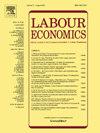分解出口商工资差距:选择还是收益差异?
IF 2.2
2区 经济学
Q2 ECONOMICS
引用次数: 0
摘要
我们的研究表明,出口商的工资差距是由工人根据比较优势进行排序而非企业选择造成的。我们首先使用了一个 AKM 式工资方程,其中包含工人、企业和剩余 "匹配 "固定效应。我们的结果表明,允许工人和企业效应取决于企业的出口状况会改变出口商工资差距的分解方式。我们的结果表明,出口企业的工人具有未观察到的特质,这些特质在出口中特别有价值,因此这些企业的工人工资较高。此外,我们还发现,工人会根据他们的不同回报进行工作转换。因此,出口商的工资差距是工人根据其比较优势自我选择进入出口企业和非出口企业的结果。最后,我们证明,放宽 AKM 式框架的线性假设,结论是稳健的。本文章由计算机程序翻译,如有差异,请以英文原文为准。
Decomposing the exporter wage gap: Selection or differential returns?
We show that the exporter wage gap is driven by workers sorting on comparative advantage rather than firm selection. We start out with an AKM-style wage equation with worker, firm, and residual “match” fixed effects. We show that allowing worker and firm effects to depend on the export status of the firm changes how the exporter wage gap is decomposed. Our results suggest that workers in exporting firms have unobserved traits that are particularly valuable in exporting, resulting in higher wages for workers in those firms. Further, we show that workers make job transitions based on their differential returns. Thus, the exporter wage gap results from workers self-selecting into exporting and non-exporting firms based on their comparative advantage. Finally, we show that the conclusion is robust to relaxing the linearity assumptions of the AKM-style framework.
求助全文
通过发布文献求助,成功后即可免费获取论文全文。
去求助
来源期刊

Labour Economics
ECONOMICS-
CiteScore
3.60
自引率
8.30%
发文量
142
期刊介绍:
Labour Economics is devoted to publishing research in the field of labour economics both on the microeconomic and on the macroeconomic level, in a balanced mix of theory, empirical testing and policy applications. It gives due recognition to analysis and explanation of institutional arrangements of national labour markets and the impact of these institutions on labour market outcomes.
 求助内容:
求助内容: 应助结果提醒方式:
应助结果提醒方式:


